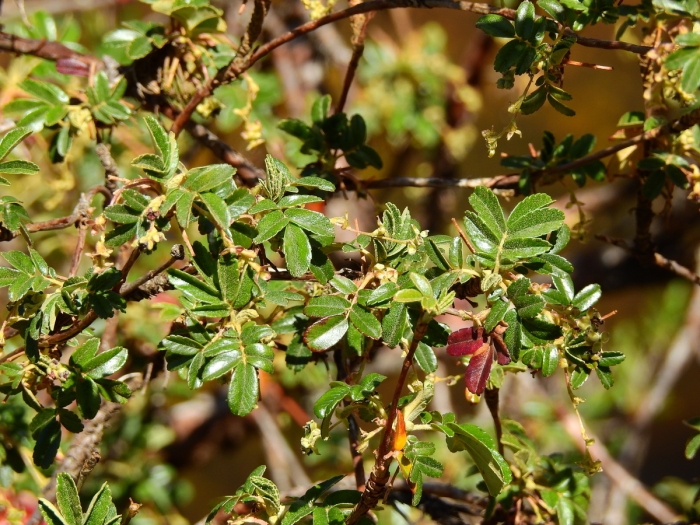Tabaquillo
(Polylepis australis)
Tabaquillo (Polylepis australis)
/
/

Guillermo Debandi
CC BY 4.0
Image By:
Guillermo Debandi
Recorded By:
Copyright:
CC BY 4.0
Copyright Notice:
Photo by: Guillermo Debandi | License Type: CC BY 4.0 | License URL: http://creativecommons.org/licenses/by/4.0/ | Rights Holder: Guillermo Debandi | Publisher: iNaturalist | Date Created: 2021-10-15T12:49:11-07:00 |























Estimated Native Range
Summary
Polylepis australis, commonly known as tabaquillo, is a slow-growing, deciduous tree endemic to the high-altitude montane forests and woodlands of the Sierras Pampeanas in central Argentina, particularly in the provinces of Catamarca, Córdoba, Jujuy, Salta, and Tucumán. It thrives at elevations between 3,900 and 9,500 feet, where it contributes to the unique ecology of these regions. Tabaquillo typically reaches heights of 10 to 15 meters, with a notable twisted and gnarled trunk. The tree is characterized by its small, pinnate leaves and distinctive exfoliating brownish bark that peels away in paper-like layers, revealing a reddish or orange underbark.
Tabaquillo is valued for its ecological role and its potential in reforestation and conservation projects, especially given its endangered status. It is adapted to the harsh conditions of its native high-elevation habitats, including poor, rocky soils and cold temperatures. In cultivation, it requires well-drained soils and can tolerate drought once established, making it suitable for xeriscaping. While not commonly used in urban landscaping, it can be an interesting specimen in botanical gardens or in naturalized plantings that mimic its native environment. Its ability to grow in difficult conditions and its unique bark make it an attractive choice for conservation-minded gardeners.CC BY-SA 4.0
Tabaquillo is valued for its ecological role and its potential in reforestation and conservation projects, especially given its endangered status. It is adapted to the harsh conditions of its native high-elevation habitats, including poor, rocky soils and cold temperatures. In cultivation, it requires well-drained soils and can tolerate drought once established, making it suitable for xeriscaping. While not commonly used in urban landscaping, it can be an interesting specimen in botanical gardens or in naturalized plantings that mimic its native environment. Its ability to grow in difficult conditions and its unique bark make it an attractive choice for conservation-minded gardeners.CC BY-SA 4.0
Plant Description
- Plant Type: Tree
- Height: 15-25 feet
- Width: 15-25 feet
- Growth Rate: Slow
- Flower Color: Green
- Flowering Season: Spring, Summer
- Leaf Retention: Evergreen
Growth Requirements
- Sun: Full Sun, Part Shade
- Water: Medium
- Drainage: Medium
Common Uses
Bird Garden, Erosion Control, Low Maintenance
Natural Habitat
High-altitude montane forests and woodlands of the Sierras Pampeanas in central Argentina
Other Names
Common Names: Tabaco del Monte, Rosa de la Montaña
Scientific Names: , Polylepis australis, Polylepis australis var. crenulata, Polylepis australis var. fuscitomentella, Polylepis australis var. glabra, Polylepis australis var. glabrescens, Polylepis australis var. latifoliolata, Polylepis australis var. oblanceolata, Polylepis australis var. subcalva, Polylepis australis var. tucumanica
GBIF Accepted Name: